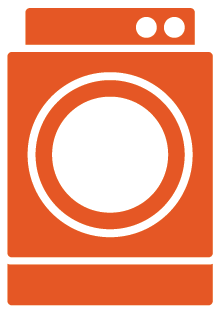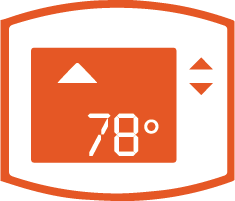
Minimize Your
Appliance Use
All of the appliances in your home cost money to run, but there are steps you can take to cut down on how much you put them to work. Following the steps below can help you save money and energy that you may be wasting.
- Use your major appliances, like the washing machine and dishwasher, during non-peak hours. For example, during summer months, washing your clothes after 8 p.m. may save energy, water, and money. Check with Austin Energy to find the peak times in your area so you know what times to avoid.
- Turn off the dishwasher before the drying cycle begins and let the dishes air dry.
- Even if you are using the appliances in your home the most efficient way, older models may still be costing your family more money and energy than necessary. Replace your old, inefficient appliances with those that have the ENERGY STAR® label. ENERGY STAR-certified products use less energy and can save your family money.
- Clean the dryer lint trap after every load and wait to do laundry until you have a full load. Interested in how you can be twice as efficient in the laundry room? Washing clothes in cold water saves not just hot water, but energy as well. Wash full loads in cold water and you save twice.
- Save energy tonight by cooking dinner on the grill instead of in the oven or on the stovetop.
- Make sure your water heater isn’t losing heat. Install an insulating blanket around the tank. Check with the manufacturer first before installing to avoid any warranty issues.
- Did you know your small appliances continue to drain energy even after they are turned off? To avoid energy usage when your appliances are off, be sure to unplug your computer, TV, CD players, video game consoles, and other small appliances.
- Do you have an under-used or nearly empty refrigerator or freezer in your garage? Unplug it until it is being used again and at full capacity. An empty refrigerator actually uses more energy to cool than a full one.
- If you have a fireplace in your home, check to see if the damper is open or closed. A damper left open when the heating or cooling system is on will allow heated or cooled air to escape up the chimney.

Don’t Overwork
Your Thermostat
LEARN HOW

Shine a Light
on Savings
LEARN HOW

